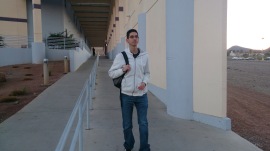By Joe Baker
Deni Djukic, College of Southern Nevada student, was diagnosed with cerebral palsy at a young age. Doctors told him that he would never walk or talk. They were wrong. He currently pursues his education in hopes of becoming a history teacher.
“Cerebral palsy—and I’m going to put this in my own words— it is a condition that makes people not able to walk, talk, see, hear, learn and think,” Djukic said. “Luckily, thanks to my parents help and support, and my sense of adaptability and determination, I was able to overcome that obstacle.”
Though Djukic had some hard times his resilience was developed.
“When I took my first steps at the age of 3 years old, I fell down—just to let you know this took place on a sidewalk. But I got up, whipped the tears in my eyes and I kept going,” Djukic said. A famous quote from the movie “The Pursuit of Happyness” comes to mind. “If you want somethin’, go get it. Period.” Djukic follows this motto.
Djukic is determined to succeed. “My motivation to keep thriving in school is to make myself better than before.”
Fani Mavrantonis, a CSN student and classmate of Djukic, enjoys having him in a class. “It makes me all happy and certainly warms my heart,” Mavrantonis said. “I enjoy hearing what he has to say.”
Djukic enjoys going to school. “I enjoy discussions in the class because it’s very interesting to hear so many different opinions. I also enjoy the fact that there is no social hierarchy, like in high school, so I can be my own person and no one will bother me.”
He is majoring in secondary education so he can teach junior high or high school history.
Though Djukic is not registered for special assistance at the College, the Disability Resource Center is available to help students.
Bradley Gruner, director of the DRC since 2009, said the purpose of the center is to help students with documented disabilities do well in their academic pursuits. Some of the services provided include: note-taking assistance, lab assistance, testing accommodations such as extended time, sign language interpreters and adaptive equipment, according to the DRC’s website.
“We work to ensure that CSN students and guests with disabilities can equitably experience what the College has to offer,” Gruner said. “For example, if a student is diagnosed with dyslexia and struggles with the ability to read fluently, accommodations would be made that would provide equal access to course content that must be read, provided that the purpose of the course is not to learn to read.”
“I understand why people get help from the DRC,” Djukic said. “Everyone is going to need a little help in one way or another at some point in his or her life, and there’s nothing wrong with that.”
“I want to make myself better and I want to be successful, not only in school but in life. I will do everything I can to get that success,” Djukic said.




